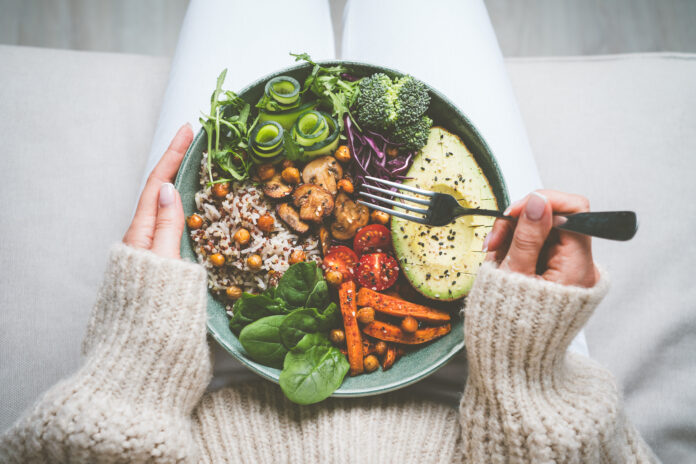Ramadan offers a precious opportunity to pause, reflect, and realign with our faith. It is also a time to reassess our daily habits and their impact on our health, the planet, and spiritual connection. While Ramadan is a time of restraint, paradoxically, it has also become a time of excess for those fortunate enough – especially in how we eat. In many Muslim households, the iftar table is overflowing with rich meats, deep-fried foods, and indulgent sweets. The abundance, though celebratory, often drifts away from the Islamic ideal of moderation.
Globally, meat consumption is rising and Muslim communities in the West are not exempt. In the U.S., the halal meat market is expected to grow by over $21 billion by 2029, driven by increased accessibility and demand. In the UK, British Muslims comprise a small percentage of the population but account for 20% of the country’s lamb consumption. Yet this ease of access has moved meat from a luxury for special occasions to a daily staple, bringing significant consequences for public and planetary health. Higher consumption of red and processed meats is linked to increased risks of chronic diseases and is associated with high levels of saturated fats and cholesterol. Meat production also contributes to 60% of food-related greenhouse gas emissions, driving global warming and climate disruption.
Islam offers a way of life centred on balance and mindfulness which should be practised in our meat consumption. The Prophet Muhammad ﷺ did not eat meat daily. Rather, it was consumed occasionally – a luxury, not a necessity. His diet was simple and plant-inclusive, built around grains, dates, fruits, and dairy, with meat reserved for special occasions.
The Prophet ﷺ said:
“Be moderate and adhere to moderation, for there is no one among you who will be saved by his deeds.”
(Sunan Ibn Majah 4201, Book 37, Hadith 102)
This principle of moderation (wasatiyyah) applies to spiritual life as well as to our everyday practices, including what and how we eat.
Plant-based diets have been mainstreamed in response to high meat consumption to reduce public health risks and environmental impact. While there is no universally agreed-upon definition of the term, it is often used to refer to diets primarily including unprocessed plant-based foods, such as vegetables, fruits, and whole grains. Plant-based diets are also associated with vegan diets, which exclude all animal products, and vegetarian diets, which exclude meat, fish, and poultry.
Plant-based eating is not just a health trend, but a part of a holistic lifestyle that reflects Islamic principles. Islam doesn’t only ask us to eat what is halal (permissible), but also what is tayyib (pure, wholesome, and ethical). Research consistently shows that plant-based diets help lower the risk of heart disease, strokes, obesity and diabetes – all non-communicable diseases increasingly affecting minority communities. Not only this, but plant-based diets also have the potential to reduce greenhouse gas emissions, land use, and water pollution by up to 75% compared to meat-heavy diets. This calls us to reflect more deeply on how our food is sourced, produced, and consumed, especially in the context of our responsibility to care for ourselves and the environment.
The Messenger of Allah ﷺ also said:
“The world is beautiful and verdant, and verily God, be He exalted, has made you His stewards in it, and He sees how you acquit yourselves.”
(Sahih Muslim)
As stewards of the Earth, our everyday habits, including our diet, play a vital role in preserving the natural world entrusted to us. This also prompts reflection on whether meat produced in factory farms, where animals are raised in confined, stressful, and unnatural conditions to meet high demand, can genuinely be considered tayyib. Modern industrial meat production falls short of the ethical standards embedded in Islamic teachings. As the demand for halal meat continues to rise, maintaining halal and tayyib standards becomes increasingly difficult for mass production. While the method of slaughter may be halal, the treatment of animals throughout their lives often contradicts Islamic values of mercy, compassion, and care.
Quranic verses and hadiths remind us of our responsibilities to all living creatures:
“And there is no creature on [or within] the earth or bird that flies with its wings except [that they are] communities like you…”
(Quran 6:38)
“A good deed done to an animal is as good as doing good to a human being; while an act of cruelty to an animal is as bad as an act of cruelty to human beings,”
(Mishkat al-Masabih; Book 6; Chapter 7)
Eating consciously by choosing halal and tayyib food is part of honouring our role as stewards of the Earth that Islam calls us to uphold. Environmental realities are already pushing us to reconsider long-held traditions. In Morocco, for example, King Mohammed VI urged citizens to refrain from performing Qurbani (animal sacrifice) during Eid al-Adha this year due to a severe seven-year drought and a significant shortage in sheep herds. This decision reflects how environmental decline impacts food availability and spiritual practices, reminding us that sustainability is not a distant concern but a present and urgent reality.
Eating more plant-based food during Ramadan does not mean abandoning tradition, but returning to the Sunnah of moderation. Seasonal vegetables, whole grains, dates, and fruits are not just healthy choices, but faith-based ones. Whether by eating less meat, supporting local ethical producers, or incorporating more plant-based meals, every choice becomes a step toward a more balanced, just, and spiritually grounded lifestyle of consuming. It is also important to acknowledge that making sustainable and ethical food choices is a privilege not available to everyone as structural inequalities, affordability, and availability may hinder access to fresh, wholesome, and ethically sourced food. For those of us who do have the means and access, these choices carry an even greater responsibility – to consume with compassion, to share with others, and to advocate for food security in all communities.



